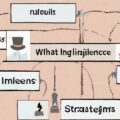The Power of Soft Skills: Nurturing Your Path to Success
In our journey through life and career, we often focus on hard skills and technical expertise. However, the true keys to lasting success and fulfillment lie in our soft skills – those intangible yet invaluable qualities that shape how we interact with others and navigate the world around us. By cultivating essential soft skills, we can not only achieve our goals but also foster deeper connections, create positive change, and lead more meaningful lives.
Empathy: The Foundation of Human Connection
At the heart of all soft skills lies empathy – the ability to understand and share the feelings of another. Empathy allows us to:
- Build stronger relationships
- Collaborate more effectively
- Resolve conflicts with compassion
- Create inclusive environments
By practicing empathy, we open ourselves to new perspectives and foster a sense of belonging for those around us. This not only enhances our personal and professional lives but also contributes to a more compassionate world.
Effective Communication: Bridging Hearts and Minds
Clear, thoughtful communication is the bridge that connects us to others. It involves not just speaking but also active listening and non-verbal cues. Developing strong communication skills enables us to:
- Express ideas with clarity and confidence
- Listen deeply and understand others’ viewpoints
- Provide constructive feedback
- Navigate difficult conversations with grace
By honing our communication skills, we create an atmosphere of trust and openness, paving the way for more meaningful connections and collaborative success.
Emotional Intelligence: Navigating the Landscape of Feelings
Emotional intelligence (EQ) is our ability to recognize, understand, and manage our own emotions while also being attuned to the emotions of others. Developing a high EQ can lead to:
- Better self-awareness and self-regulation
- Improved stress management
- Enhanced leadership abilities
- More fulfilling personal and professional relationships
By cultivating emotional intelligence, we become more resilient, adaptable, and capable of creating positive environments wherever we go.
Adaptability: Embracing Change with Grace
In our rapidly evolving world, the ability to adapt is crucial. Adaptability allows us to:
- Remain calm in the face of uncertainty
- Learn and grow from new experiences
- Pivot strategies when needed
- Embrace innovation and change
By developing adaptability, we not only navigate challenges more effectively but also open ourselves to new opportunities for growth and success.
Collaboration: The Art of Working Together
No person is an island, and our ability to collaborate effectively can make or break our success. Strong collaboration skills enable us to:
- Leverage diverse strengths and perspectives
- Foster a sense of teamwork and shared purpose
- Achieve goals that would be impossible alone
- Create synergy and innovative solutions
By embracing collaboration, we not only enhance our own capabilities but also contribute to the collective success of our communities and organizations.
Frequently Asked Questions
Q1: Why are soft skills important in today’s world?
A1: Soft skills are crucial in today’s interconnected world because they enable us to navigate complex social dynamics, adapt to rapid changes, and create meaningful connections. While technical skills may get you hired, it’s often soft skills that lead to long-term success and fulfillment in both personal and professional spheres.
Q2: Can soft skills be learned, or are they innate?
A2: While some people may have a natural inclination towards certain soft skills, they can absolutely be learned and developed over time. Like any skill, improving soft skills requires practice, self-reflection, and a willingness to step out of your comfort zone.
Q3: How can I improve my empathy?
A3: To improve empathy, try actively listening to others without judgment, putting yourself in their shoes, reading diverse literature to gain new perspectives, and practicing mindfulness to become more aware of your own and others’ emotions.
Q4: What’s the difference between IQ and EQ?
A4: IQ (Intelligence Quotient) measures cognitive abilities like logical reasoning and problem-solving. EQ (Emotional Quotient) measures emotional intelligence, including self-awareness, empathy, and social skills. While both are important, EQ is often considered more crucial for overall life success and happiness.
Q5: How can I demonstrate soft skills in a job interview?
A5: In a job interview, you can demonstrate soft skills by providing specific examples of how you’ve used them in past situations. Show your communication skills through clear, thoughtful responses, display adaptability by discussing how you’ve handled changes, and exhibit empathy and collaboration through stories of teamwork and conflict resolution.
In conclusion, nurturing our soft skills is a lifelong journey that not only leads to personal and professional success but also contributes to a more compassionate, connected world. By focusing on empathy, communication, emotional intelligence, adaptability, and collaboration, we equip ourselves with the tools to navigate life’s challenges, build meaningful relationships, and create positive change in our communities. Remember, the path to true success is not just about what we achieve, but how we achieve it and the impact we have on others along the way.









